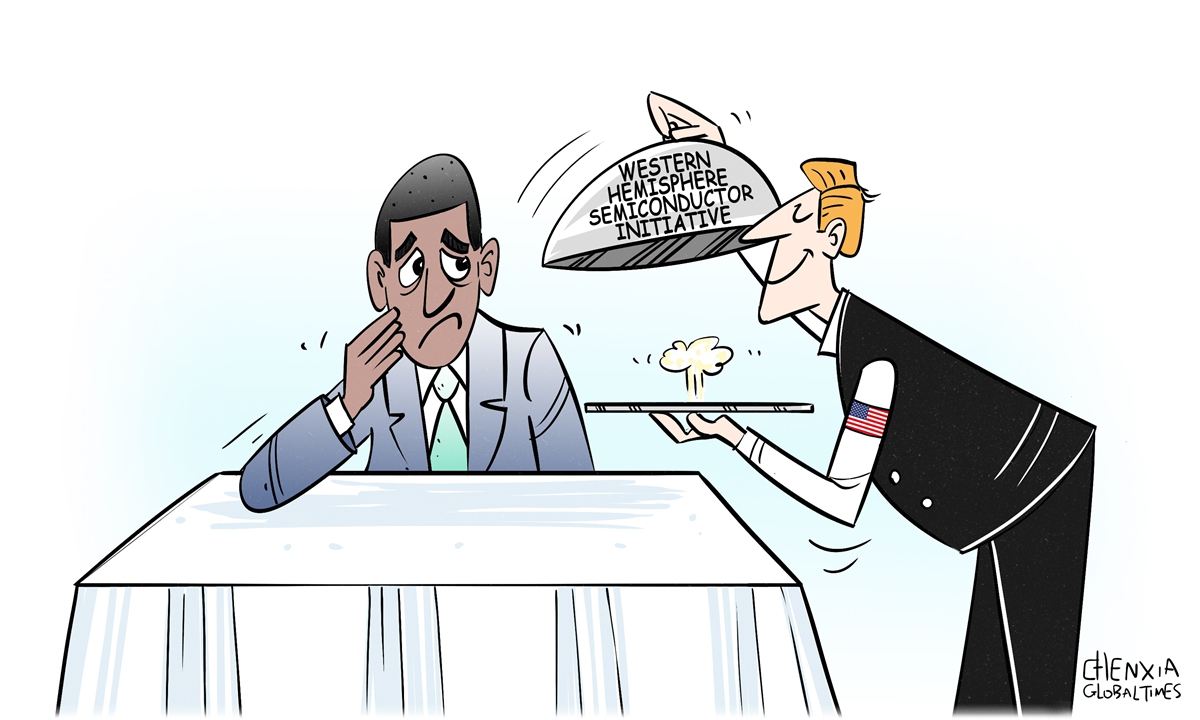
Illustration: Chen Xia/GT
US Secretary of State Antony Blinken unveiled Wednesday a new program to boost production of semiconductors in some Latin American countries. "This initiative will turbocharge countries' capacity to assemble, to test and to package semiconductors, beginning with Mexico, Panama and Costa Rica," Blinken said, according to AFP.
It's not a bad thing if Latin American countries gain manufacturing investment from the US. But the program may be just "lip service" from the US.
The Western Hemisphere Semiconductor Initiative comes as Washington tries to reignite the flame of semiconductor manufacturing in the US. The government is flexing all policy muscles to boost domestic semiconductor manufacturing by suppressing its competitors. So, it is almost impossible for the US to give full support to other countries' efforts in advancing semiconductor manufacturing.
What the US wants is perhaps to establish small cliques of allies in the Americas. Even if semiconductor industrial chains can be established in the Americas under the Western Hemisphere Semiconductor Initiative, the US-led alliance will require Latin American countries to serve US interests. Rising labor costs in the US may push some labor-intensive semiconductor manufacturing to Latin American countries with lower costs. However, those businesses have low added value.
Semiconductor manufacturing is divided into two parts - front-end and back-end. The front-end segment refers to the manufacturing of wafers, while the back-end process consists of packaging and testing. It is widely believed that the US will focus on the front-end part.
Although the US may bring Latin American countries some small-scale investment in back-end semiconductor manufacturing, we don't think it will be very helpful in boosting the development of manufacturing in Latin American countries.
Although the US is a world leader in cutting-edge chip design, its share of global semiconductor manufacturing reportedly declined from 37 percent in 1990 to about 12 percent in 2023. Even if the US is truly willing to extend its semiconductor industrial chain to Latin American countries, the investment it can bring will be limited.
Reviving US manufacturing has been a key goal for the Biden administration, but it is not an easy task. Short-term incentives and subsidies cannot improve the long-term competitiveness of the US manufacturing industry. If the US fails to revive its chip sector, the Western Hemisphere Semiconductor Initiative will end up being just words for Latin American countries.
Because of different national conditions, the economic and manufacturing situations in Latin America are complex and uneven. Some countries are still in the initial stage of industrialization, and there will be many technical obstacles that stand in the way of producing cutting-edge semiconductors.
Those countries in Latin America have no foundation in chip manufacturing in terms of technology, talent or the support of upstream and downstream industrial chains. The Western Hemisphere Semiconductor Initiative will be of limited help to stimulate the development of those countries' manufacturing sectors.
Some Latin American countries are accelerating their integration into the global semiconductor manufacturing chain. For example, Brazil has introduced multiple policies to support the development of the semiconductor industry.
However, those countries need to realize that they cannot rely on the US to develop their semiconductor industries, especially front-end chip manufacturing.
Those countries must pursue a path of independent innovation and overcome challenges in developing strategic emerging industries such as semiconductor manufacturing.
China's semiconductor industry has for many years been struggling to catch up. The country has made great strides toward innovation and a technology-driven economy in recent years.
For the semiconductor industry, China has always maintained an open and cooperative attitude. China and Latin American countries share broad potential for cooperation in such areas as semiconductor-related industries.
The author is a reporter with the Global Times. bizopinion@globaltimes.com.cn




